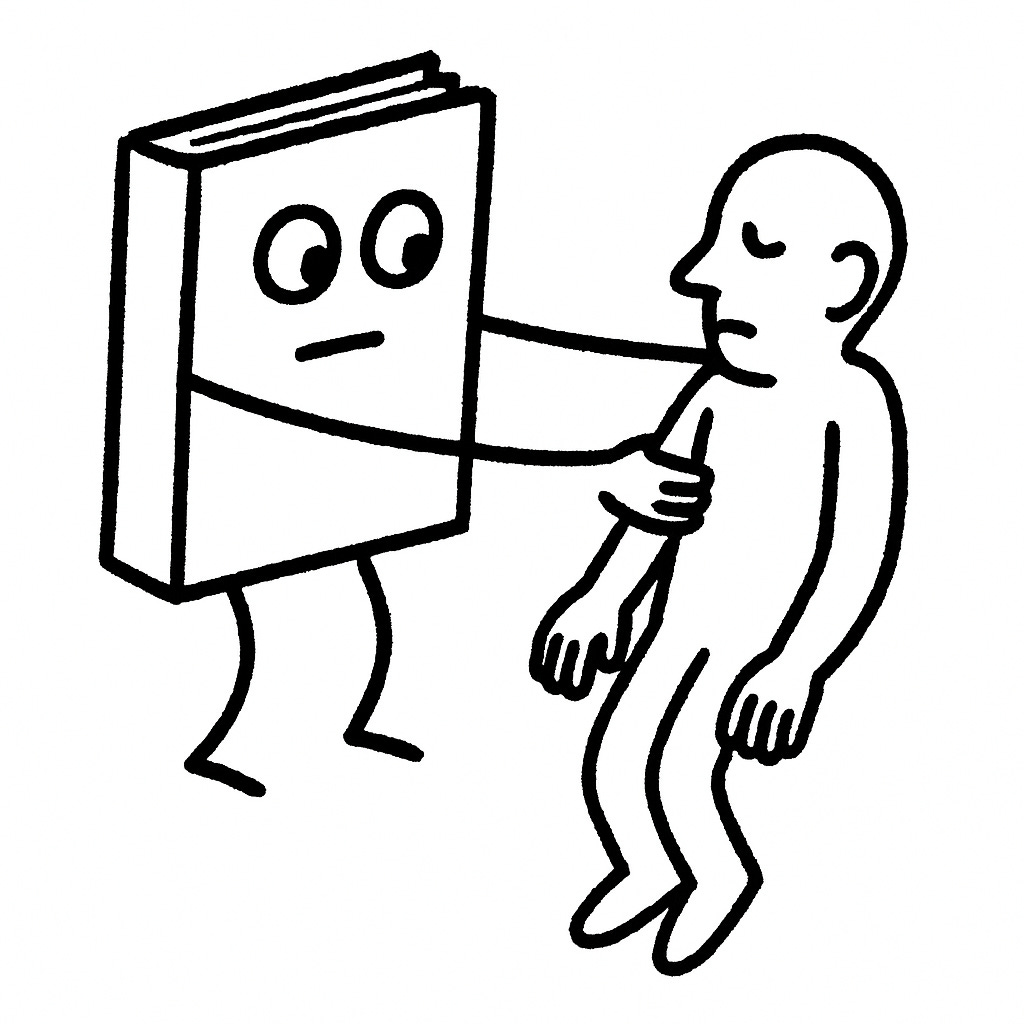책이 갑자기 팔을 뻗어 독자의 팔을 붙잡았다.
"뭐야, 이게?" 지훈은 비명을 지르며 뒤로 물러섰다.
책은 눈을 깜빡이며 말했다. "좀 더 주의 깊게 읽어주시겠어요? 당신은 지난 세 페이지 동안 하품만 했어요."
지훈은 자신의 눈을 비볐다. 어쩌면 그가 너무 피곤한 것일까?
"내 이야기가 그렇게 지루한가요?" 책이 물었다, 표지에 그려진 입술이 삐죽거리며.
"아니, 그런 게 아니라..." 지훈은 말을 더듬었다. "그냥 오늘 일이 힘들었어."
책은 한숨을 쉬었다. "항상 같은 변명이에요. 지난주에는 '두통이 있다'더니, 그 전에는 '집중하기 어렵다'고 했죠."
지훈은 웃음을 참을 수 없었다. "내가 정말 그렇게 나쁜 독자였나?"
"최악이에요," 책이 대답했다. "당신은 내 페이지에 커피를 흘리고, 모서리를 접고, 심지어 결말을 미리 봤어요!"
지훈은 부끄러움에 얼굴이 붉어졌다. "미안해. 내가 어떻게 보상해줄까?"
책은 잠시 생각하더니 말했다. "오늘 밤, 끝까지 읽어주세요. 그리고 제발, 이번엔 잠들지 말고요."
"책이 갑자기 팔을 뻗어 독자의 팔을 붙잡았다."
✱ "The book suddenly stretched out its arm and grabbed the reader's arm."
책이: Subject marker (이) attached to 책 (book)
갑자기: Suddenly
팔을: Object marker (을) attached to 팔 (arm)
뻗어: Verb 뻗다 (to stretch out) in connective form
독자의: Possessive form (의) of 독자 (reader)
팔을: Object marker (을) attached to 팔 (arm)
붙잡았다: Verb 붙잡다 (to grab/hold) in past tense
"뭐야, 이게?" 지훈은 비명을 지르며 뒤로 물러섰다."
✱ "What is this?" Jihun screamed and stepped back."
뭐야: What is it (casual)
이게: 이것 (this) + 이 (subject marker) contracted
지훈은: Topic marker (은) attached to 지훈 (name)
비명을: Object marker (을) attached to 비명 (scream)
지르며: Verb 지르다 (to shout/scream) in simultaneous action form (-며)
뒤로: To the back/backward
물러섰다: Verb 물러서다 (to step back) in past tense
"책은 눈을 깜빡이며 말했다. "좀 더 주의 깊게 읽어주시겠어요? 당신은 지난 세 페이지 동안 하품만 했어요.""
✱ "The book blinked its eyes and said, "Would you please read more carefully? You've been yawning for the past three pages.""
책은: Topic marker (은) attached to 책 (book)
눈을: Object marker (을) attached to 눈 (eyes)
깜빡이며: Verb 깜빡이다 (to blink) in simultaneous action form (-며)
말했다: Verb 말하다 (to say) in past tense
좀 더: A bit more
주의 깊게: Carefully
읽어주시겠어요: Verb 읽다 (to read) + 주다 (to do for someone) + 시 (honorific) + 겠 (future/intention) + 어요 (polite ending)
당신은: Topic marker (은) attached to 당신 (you)
지난: Past
세: Three
페이지: Pages
동안: During
하품만: 하품 (yawn) + 만 (only)
했어요: Verb 하다 (to do) in past tense, polite form
"지훈은 자신의 눈을 비볐다. 어쩌면 그가 너무 피곤한 것일까?"
✱ "Jihun rubbed his eyes. Perhaps he was too tired?"
지훈은: Topic marker (은) attached to 지훈 (name)
자신의: Possessive form (의) of 자신 (oneself)
눈을: Object marker (을) attached to 눈 (eyes)
비볐다: Verb 비비다 (to rub) in past tense
어쩌면: Perhaps
그가: Subject marker (가) attached to 그 (he)
너무: Too
피곤한: Adjective 피곤하다 (to be tired) in modifier form
것일까: 것 (thing) + 이다 (to be) in question form
""내 이야기가 그렇게 지루한가요?" 책이 물었다, 표지에 그려진 입술이 삐죽거리며."
✱ ""Is my story that boring?" the book asked, with the lips drawn on the cover pouting."
내: My
이야기가: Subject marker (가) attached to 이야기 (story)
그렇게: That/so
지루한가요: Adjective 지루하다 (to be boring) in question form, polite
책이: Subject marker (이) attached to 책 (book)
물었다: Verb 묻다 (to ask) in past tense
표지에: Particle 에 (on) attached to 표지 (cover)
그려진: Verb 그리다 (to draw) in passive past modifier form
입술이: Subject marker (이) attached to 입술 (lips)
삐죽거리며: Verb 삐죽거리다 (to pout) in simultaneous action form (-며)
""아니, 그런 게 아니라..." 지훈은 말을 더듬었다. "그냥 오늘 일이 힘들었어.""
✱ ""No, it's not like that..." Jihun stammered. "Just that today's work was hard.""
아니: No
그런 게 아니라: 그런 것 (such thing) + 이 (subject marker) + 아니라 (is not)
지훈은: Topic marker (은) attached to 지훈 (name)
말을: Object marker (을) attached to 말 (words)
더듬었다: Verb 더듬다 (to stammer) in past tense
그냥: Just
오늘: Today
일이: Subject marker (이) attached to 일 (work)
힘들었어: Adjective 힘들다 (to be difficult) in past tense, casual form
"책은 한숨을 쉬었다. "항상 같은 변명이에요. 지난주에는 '두통이 있다'더니, 그 전에는 '집중하기 어렵다'고 했죠.""
✱ "The book sighed. "Always the same excuse. Last week you said 'I have a headache,' and before that, you said 'It's hard to concentrate.'""
책은: Topic marker (은) attached to 책 (book)
한숨을: Object marker (을) attached to 한숨 (sigh)
쉬었다: Verb 쉬다 (to take/breathe) in past tense
항상: Always
같은: Same
변명이에요: 변명 (excuse) + 이에요 (is, polite form)
지난주에는: 지난주 (last week) + 에는 (in/on + topic marker)
두통이 있다: 두통 (headache) + 이 있다 (exists/have)
더니: Ending indicating contrast with what follows
그 전에는: 그 전 (before that) + 에는 (at + topic marker)
집중하기: Verb 집중하다 (to concentrate) + 기 (nominalizer)
어렵다고: Adjective 어렵다 (difficult) + 고 (quotation marker)
했죠: Verb 하다 (to say/do) in past tense, casual polite form
"지훈은 웃음을 참을 수 없었다. "내가 정말 그렇게 나쁜 독자였나?""
✱ "Jihun couldn't hold back his laughter. "Was I really such a bad reader?""
지훈은: Topic marker (은) attached to 지훈 (name)
웃음을: Object marker (을) attached to 웃음 (laughter)
참을 수 없었다: 참다 (to hold back) + 을 수 없다 (cannot) in past tense
내가: Subject marker (가) attached to 나 (I)
정말: Really
그렇게: That/so
나쁜: Adjective 나쁘다 (to be bad) in modifier form
독자였나: 독자 (reader) + 이었나 (was, question form)
""최악이에요," 책이 대답했다. "당신은 내 페이지에 커피를 흘리고, 모서리를 접고, 심지어 결말을 미리 봤어요!""
✱ ""The worst," the book answered. "You spilled coffee on my pages, folded the corners, and even looked at the ending in advance!""
최악이에요: 최악 (worst) + 이에요 (is, polite form)
책이: Subject marker (이) attached to 책 (book)
대답했다: Verb 대답하다 (to answer) in past tense
당신은: Topic marker (은) attached to 당신 (you)
내: My
페이지에: Particle 에 (on) attached to 페이지 (pages)
커피를: Object marker (를) attached to 커피 (coffee)
흘리고: Verb 흘리다 (to spill) in connective form
모서리를: Object marker (를) attached to 모서리 (corners)
접고: Verb 접다 (to fold) in connective form
심지어: Even
결말을: Object marker (을) attached to 결말 (ending)
미리: In advance
봤어요: Verb 보다 (to see/look) in past tense, polite form
"지훈은 부끄러움에 얼굴이 붉어졌다. "미안해. 내가 어떻게 보상해줄까?""
✱ "Jihun's face reddened with embarrassment. "I'm sorry. How can I make it up to you?""
지훈은: Topic marker (은) attached to 지훈 (name)
부끄러움에: Particle 에 (with/due to) attached to 부끄러움 (embarrassment)
얼굴이: Subject marker (이) attached to 얼굴 (face)
붉어졌다: Verb 붉어지다 (to become red) in past tense
미안해: I'm sorry (casual)
내가: Subject marker (가) attached to 나 (I)
어떻게: How
보상해줄까: Verb 보상하다 (to compensate) + 주다 (to do for someone) in question form
"책은 잠시 생각하더니 말했다. "오늘 밤, 끝까지 읽어주세요. 그리고 제발, 이번엔 잠들지 말고요.""
✱ "The book thought for a moment and said, "Tonight, please read until the end. And please, don't fall asleep this time.""
책은: Topic marker (은) attached to 책 (book)
잠시: For a moment
생각하더니: Verb 생각하다 (to think) + 더니 (and then)
말했다: Verb 말하다 (to say) in past tense
오늘 밤: Tonight
끝까지: 끝 (end) + 까지 (until)
읽어주세요: Verb 읽다 (to read) + 주다 (to do for someone) in imperative, polite form
그리고: And
제발: Please
이번엔: 이번 (this time) + 은 (topic marker)
잠들지 말고요: 잠들다 (to fall asleep) + 지 말다 (don't) in connective form + 요 (polite ending)
한국어로 댓글을 남겨주세요. ✱ Leave a comment in Korean.
Support by leaving a like 👍, restacking 🔁, or sharing it with others.












Share this post